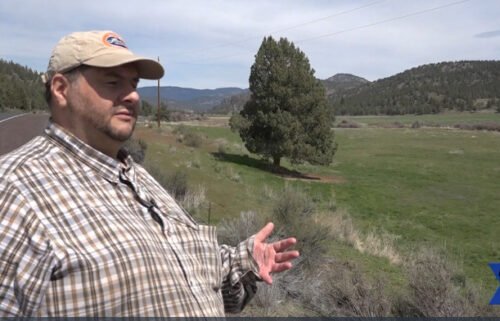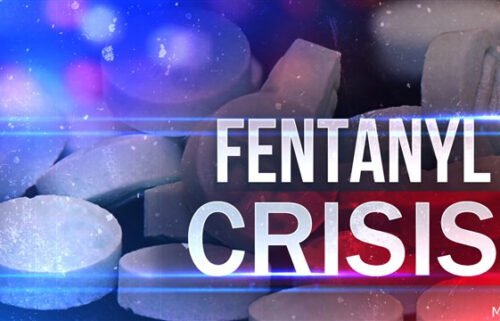‘One death is too many’: Rise in drug overdoses concerns Central Oregon health officials
(Update: Adding video, comments from health officials, treatment provider)
Two fatal; overdoses involve heroin, opioids, methamphetamine; users urged to take added precautions
BEND, Ore. (KTVZ) -- Central Oregon public health officials are expressing concern about a recent rise in drug overdoses around the region. In less than three weeks, there have been two fatal overdoses, and 20 to 32 non-fatal overdoses. On Monday they outlined steps being taken to combat the issue.
"One death is too many -- because overdose is completely preventable," Katie Plumb, chair of the regional overdose response task force, said Wednesday.
Between April 9th and Monday, there have been about 20 confirmed and 12 unconfirmed non-fatal overdoses in the Central Oregon region, along with two confirmed deaths from overdoses, according to the Central Oregon Public Health Overdose Team, a regional initiative between Crook, Deschutes and Jefferson counties.
Heroin, opioids, and methamphetamines are to blame. There are several other substances that have yet to be identified, many of which likely contain fentanyl, a synthetic opioid 100 times more powerful than morphine.
Eighteen doses of naloxone were administered overall to revive and save several lives. There were several overdoses where it is unknown if naloxone was administered.
Health officials are still pulling together information about the ages, gender and other details about the recent cases.
"We're still pretty early on in our surveillance, but our goal is to really gather that information and narrow that down to what exactly is happening," Plumb told NewsChannel 21 Wednesday.
The program manager of Serenity Lane treatment facility in Bend days they've also seen an increase in substance abuse patients. He believes it is connected with the pandemic.
"We've seen an uptake in patients seeking services -- I think in relation to the pandemic. People being disconnected from their social circles, being in isolation, these type of things lead to more or less a perfect storm for addiction." Glenn Deveney told NewsChannel 21 on Wednesday.
Deveney says there are beds available at the facility for new patients.
Lynn Vigil, the Central Oregon overdose crisis response coordinator, says she believes education about substance abuse and overdoses is needed.
"It's just really important, I think, that people know this is happening. That treatment providers, law enforcement ,and folks have the appropriate messaging to share with people, and that the using community has messaging," she said. "Things like 'don't use alone' -- so they have the resources they need so that they stay safe. Or that we save lives."
Here's the rest of a news release, issued Friday:
Here is a list of resources available for substance abuse and overdoses:
What are Central Oregon Health Departments doing in response?
- Coordinating with first responders and community partners to monitor and prevent additional overdoses.
- Updating websites, social media and other communications to increase awareness.
Actions for community partners:
- Please immediately share harm reduction messaging with your clients [e.g., "We have heard about a possible increase in overdoses. [When using, please go slow and make sure you are around others. If you have access to Narcan, make sure everyone knows where it is and how to use it.”].
- Ask clients if they have any information [e.g., “Have you seen an increase in overdoses? Any idea what might be causing it?”].
- Do not add information to community messages that is not confirmed by County Health Officials. Be careful to not give information that can give opiate users a false sense of security, increasing risk of morbidity and mortality.
Prevention:
The Central Oregon Public Health Overdose Team is issuing a warning to people who use drugs to take additional precautions. People who choose to use pills outside of a care plan developed with a healthcare provider, or who use other substances [e.g., heroin and/or methamphetamine] should take steps to reduce the risk of an overdose. Steps you can take to reduce an overdose are:
- Avoid any pills that are not prescribed by a medical provider.
- Be extremely cautious when using more than one substance at the same time, it is highly likely there is fentanyl in most drugs purchased on the street.
- Don’t use alone – If you are going to use by yourself, call (800) 484-3731, NeverUseAlone.com. You will be asked for your first name, location, and the number you are calling from. An operator will stay on the line with you while you use. If you stop responding after using, the operator will notify emergency services of an "unresponsive person" at your location.
- Carry naloxone, also known as the nasal spray Narcan, the only medication that can reverse an opioid overdose. You can obtain free Naloxone from most pharmacies throughout Central Oregon without a prescription.
- Carry fentanyl test strips and test all newly purchased substances before first use.
- Where can you obtain free test strips from Harm reduction services?
- Crook County Public Health Department located at 375 NW Beaver Street, Suite 100, Prineville, Oregon – Monday – Friday 8:00 am – 5:00 pm
- Deschutes County Public Health Department at https://www.deschutes.org/health/page/syringe-exchange-program
- Jefferson County Public Health Department at 541-475-4456
For more information please contact:
Lynn Vigil – Regional Crisis Overdose Response Coordinator
541-777-1273 – Work Cell




